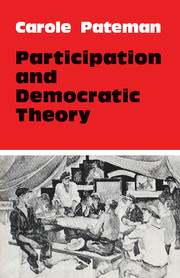Book contents
- Frontmatter
- Contents
- I Recent theories of democracy and the ‘classical myth’
- II Rousseau, John Stuart Mill and G. D. H. Cole: a participatory theory of democracy
- III The sense of political efficacy and participation in the workplace
- IV ‘Participation’ and ‘democracy’ in industry
- V Workers' self-management in Yugoslavia
- VI Conclusions
- Bibliography
- Index
II - Rousseau, John Stuart Mill and G. D. H. Cole: a participatory theory of democracy
Published online by Cambridge University Press: 05 August 2014
- Frontmatter
- Contents
- I Recent theories of democracy and the ‘classical myth’
- II Rousseau, John Stuart Mill and G. D. H. Cole: a participatory theory of democracy
- III The sense of political efficacy and participation in the workplace
- IV ‘Participation’ and ‘democracy’ in industry
- V Workers' self-management in Yugoslavia
- VI Conclusions
- Bibliography
- Index
Summary
Rousseau might be called the theorist par excellence of participation, and an understanding of the nature of the political system that he describes in The Social Contract is vital for the theory of participatory democracy. Rousseau's entire political theory hinges on the individual participation of each citizen in political decision making and in his theory participation is very much more than a protective adjunct to a set of institutional arrangements; it also has a psychological effect on the participants, ensuring that there is a continuing interrelationship between the working of institutions and the psychological qualities and attitudes of individuals interacting within them. It is their stress on this aspect of participation and its place at the centre of their theories that marks the distinctive contribution of the theorists of participatory democracy to democratic theory as a whole. Although Rousseau was writing before the modern institutions of democracy were developed, and his ideal society is a non-industrial city-state, it is in his theory that the basic hypotheses about the function of participation in a democratic polity can be found.
In order to understand the role of participation in Rousseau's political theory it is essential to be clear about the nature of his ideal, participatory political system, as this has been subject to widely differing interpretations. Firstly, Rousseau argued that certain economic conditions were necessary for a participatory system. As is well known Rousseau advocated a society made up of small, peasant proprietors, i.e. he advocated a society of economic equality and economic independence.
- Type
- Chapter
- Information
- Participation and Democratic Theory , pp. 22 - 44Publisher: Cambridge University PressPrint publication year: 1970
- 4
- Cited by



